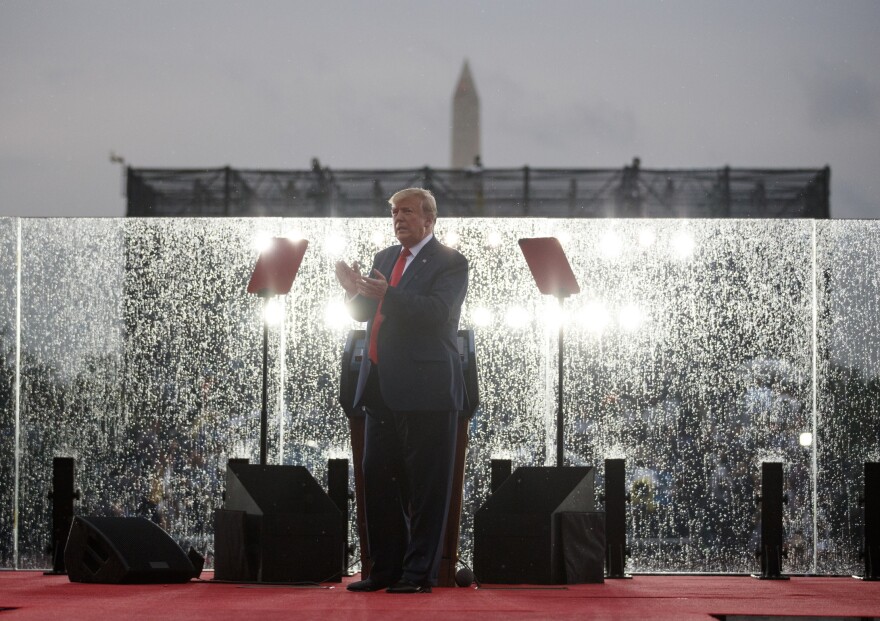President Trump announced he planned to repeat his 4th of July salute to the military next year as a trio of Senate Democrats called for an investigation into how much the Washington, D.C., event cost the taxpayers.
"It was a wonderful day for all Americans and based on its tremendous success, we're just making the decision and I think we can say we've made the decision to do it again next year, and maybe we can say, for the foreseeable future," Trump said at an event at the White House on Monday.
But less than a week after Trump led an expanded Fourth of July party in the nation's capital, Senate Democrats have demanded a government probe of how much the final tab will cost taxpayers.
Democratic Sens. Tom Udall of New Mexico, Patrick Leahy of Vermont and Chris Van Hollen of Maryland called for a federal watchdog to dig into Trump's military tribute event on Thursday. All three are members of the Senate Appropriations Committee.
The lawmakers formally requested on Monday that the Government Accountability Office investigate spending for the president's Lincoln Memorial speech, a slew of military flyovers, several Army vehicles on display and heightened security.
The senators also want to know whether the event's expenses comply with restrictions banning political activity on the public's dime.
"Congress did not specifically provide funds to cover the costs of the President's expanded Fourth of July events, and we are very concerned by the impacts and the precedent of diverting limited Federal resources — including the use of military personnel, equipment and aircraft as well as other appropriations or visitor fees paid to improve national parks — to organize and execute unbudgeted events," the senators wrote in a letter Monday to the GAO.
The Democratic lawmakers say American taxpayers are looking at a bigger bill for the Independence Day party, but the Trump administration has been tight-lipped about the total costs.
The annual July 4 parade was followed that evening in a rainy Washington with the Trump address, featuring flyovers by the jetliner used for Air Force One, the Navy's Blue Angels, the B-2 Spirit (also known as the Stealth Bomber) and others. The new helicopter that will be used as Marine One and other military helicopters also participated. All five military services were represented in the flyovers.
The flyovers alone were expected to cost more than $500,000, based on Defense Department flight-hour estimates. Last week, The Washington Post reported the National Park Service would shift $2.5 million in park fees to help cover the new spending.
Trump's speech was attended by military leaders, administration officials, VIPs, family and friends who obtained tickets from the White House, the Republican National Committee and the Defense Department.
"We are troubled by reports that preferential access to the National Mall was organized by political entities such as the Republican National Committee, which furthers the appearance that taxpayer funds were used to accomplish political objectives," the lawmakers wrote.
While the soggy weather caused some issues for some who attended, the Federal Aviation Administration still suspended operations at Reagan National Airport for more than two hours for the flyovers and later for an expanded fireworks celebration.
Lawmakers want the GAO to look into the event in the midst of a $12 billion maintenance backlog for the National Park Service. They are also raising questions about a video produced of the event tweeted by the White House and the Trump campaign.
— Donald J. Trump (@realDonaldTrump) July 5, 2019
"As part of our Committee's oversight of Federal spending, we ask that you review the fiscal year 2019 Fourth of July events held on the National Mall and provide us with comprehensive cost estimates for the planning and execution of these events, including personnel, security, event logistics, production, travel, transportation, communications, and related costs, as well as any costs to address resource damage created by the events," the lawmakers wrote. "We also seek historical data to use as a comparison."
Copyright 2020 NPR. To see more, visit https://www.npr.org. 9(MDAxMzY2MjQ0MDEyMzcyMDQ5MzBhZWU5NA001))




